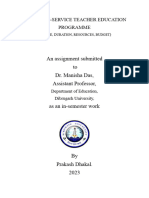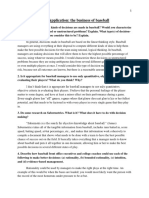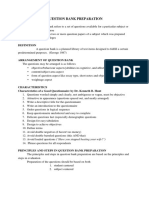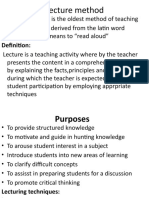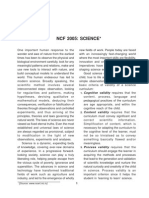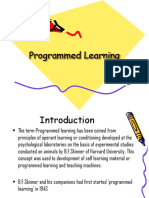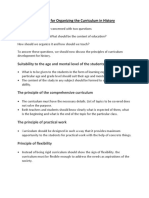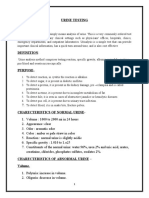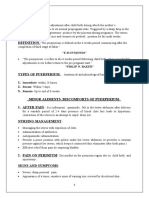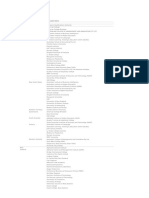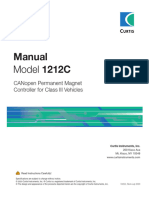Unit Plan: Introduction
Unit Plan: Introduction
Uploaded by
suman guptaCopyright:
Available Formats
Unit Plan: Introduction
Unit Plan: Introduction
Uploaded by
suman guptaOriginal Title
Copyright
Available Formats
Share this document
Did you find this document useful?
Is this content inappropriate?
Copyright:
Available Formats
Unit Plan: Introduction
Unit Plan: Introduction
Uploaded by
suman guptaCopyright:
Available Formats
Unit plan
Introduction – The teacher has to recognize the content of the textbook on the subject into
suitable units. ’unit’ is developed psychologically in the student as a means of integration;
unitary technology teaching necessities the interlocking of idea in order to achieve full
understanding.
Unit planning stands for the planning of the instructional work of the session by
dividing the prescribed syllabus into some well defined and meaningful units
DEFINITION- “A unit consists of a comprehensive series of related and meaningful
activities so developed pupil purpose, provide significant educational experience and result
in appropriate behavior changes.”
“ (H. C. Morrison)”
“Unit is an outline of carefully selected subject matter which has been isolated because of its
relationship to pupil’s needs and interests.”
“(According to Samford)”
“It is large block of related subject matters as can overview by the leader.”
“(According to Preston)”
“ Unit planning may be defined as a scheme on plan chalked out for the teaching learning of a
particular unit, a meaningful and complete sub-division of the learning experience to be given in
whole session motioning the way and means of importing learning experience related to that
unit in view of the proper realization of its teaching learning objectives .
CARACTERISTIC OF UNIT PLAN –
1. Effectively in terms of whole rather than fraction
2. Developmental & therefore provide for vertical & horizontal organization of learning
experience
3. Effective when is an understanding and acceptance of goal to be achieved & there is
full and free participation in planning for the attainment of those goals.
4. Necessity for providing for individual differences in rates of learning & interests. E.g.
project, field work, conference etc.
5. Unit planning recognizes that true learning renders the learners increasingly skill in
self- directions.
6. Unit planning provides sound basis for evaluation.
CRITERIA OF A GOOD UNIT-
The need, capabilities and interests of the students should be kept in view.
A variety of experience should be planned for better learning E.g. fields trips
,experiments, demonstrations , projects etc
The previous experience and background of the students should be taken into account.
The length of unit should be based on the interest of the students.
Provide an opportunity for new experiences.
Familiar and related topics should be included in the unit .
Unit should be a part of sequence that permits growth from year to year.
Unit should be the result of cooperative planning of teacher and students.
Importance has to be given to integrate learning outcome.
Represents both subject matter into units of experience as well.
Organized similar type of subject matter.
It achieves a set of specification and objectives.
The availability of periods should be considered
ESSENTIAL ACTIVITIES OF UNIT PLANNING-
1. SELECTION & STATEMENT OF OBJECTIVES- To bring desirable change in behavior
which is manifested result of specific teaching learning activities.
2. SELECTIONOF CONTENT-
Fact, concept, principle which are required to objective of unit
Information ,generalization , subject matter
Source for it knowledge components textbook , reference ,periodicals, journals
Audio -visual aids
Education resources – study of a client at home, hospital, or clinic or any situation.
The content and learning experience for a unit
Primary emphasis in nursing course is placing scientific principles along with the
development of skills.
Pretest has to be administered to test the knowledge, understanding and skill in the
area.
3. DISTRIBUTION OF TIME AND THE ALLOTMENT OF TIME
4. ORGANIZATION OF CONTENT OF THE UNIT-
To meet the desire objectives keeping in mind the curriculum, policies, administrative
pattern. Subjective matter or learning experience has to be organized for student
development-
Reinforce in a manner
To create a border and deeper understanding of knowledge base
To develop, refine and strengthen the skills already acquired.
5. SELECTION OF TEACHING AND LEARNING ACTIVITIES-
Tracing out and utilization of available education resources and flexibility
according to the need , providing opportunities for student to practice the
behaviors they are expected to develop as a result of participation in these
activities.
6. TEACHER’S EXPERTIES- The teacher should have knowledge :
Teaching –learning process
Learner for whole she is planning the course
Of the subject that she is teaching
Of the unit
Positive attitude towards teaching and student together with her experience in
teaching
Teacher’s expertise plays a pivotal role in shaping the student in the desired
manner a moulding them with positive attitude.
7. SELECTION OF METHOD OF EVALUATION- To find out how effective the teaching
learning activities have been.
To ascertain the extent of student learning ongoing and terminal plans are necessary.
8. SELECTION OF REFERENCE- Reading of relevant books, articles , journals is necessary .
the school should have a good library equipped with journals , periodicals ,books and library
reference material which will aid in the teaching-learning process.
Teacher should give the reference to the students for their self-study according to their needs and
level
STEP IN UNIT PLAN-
1. SELECTION AND SYSTEMATISATION OF THE UNIT
2. CONTENT ANALYSIS
3. DETERMINATION OF OBJECTIVES
4. LEARNING EXPERIENCE
5. SELECTING OF TEACHING AIDS
6. EVALUATION
7. ASSIGNMENT
1. SELECTION AND SYSTEMATISATION OF THE UNIT- The first step in the preparation
of a unit from the subject. A unit should be viewed as a whole.
2. CONTENT ANALYSIS-After selecting this unit, the teacher has analysis help its content
carefully. This analysis helps the teacher to have a thorough knowledge of the subject
matter.
3. DETERMINATION OF OBJECTIVES-The third step is to determine the major as well as
specific objectives that should be realized by teaching this unit.
4. LEARNING EXPERIENCE-Deciding upon the major learning experience is the next
step. These should be objective based life centered and learned centered.
5. SELECTING OF TEACHING AIDS- For making the learning experiences objective
based and effective a variety of instructional aids may become necessary. The next step is
to decide carefully what are the teaching aids should be used.
6. EVALUATION-The types of evaluation tools and techniques for assessing the realization
of the pre-determined goals are to be selected in this stage.
7. ASSIGNMENT –The final step is to decide upon the assignment to be given to student.
MERITS OF UNIT PLAN-
To enable the teachers to work continuously and effectively throughout the academic
year for all the units.
Teaching learning process become more effective
Give proper learning experience in an integrated manner to the students.
Fulfill certain objectives of that level
LIMITATION OF UNIT PLANNING-
Overburdening task for teachers
Time consuming process
Put restriction on freedom of teachers
Locks component of freshness and make process mechanical
Unit planning on the part of one teacher may create problem in case he gets transferred or
substituted.
It requires a conscious effort on the part of teacher . a less experienced teacher sometimes
find it difficult to plan units.
You might also like
- 08 Unit PlanningDocument6 pages08 Unit Planningamit90% (10)
- Computer Assisted LearningDocument15 pagesComputer Assisted Learningmanju talluri100% (4)
- Load ChartDocument4 pagesLoad ChartVishnu Menon100% (6)
- Planning in Service Teacher Education ProgrammeDocument5 pagesPlanning in Service Teacher Education ProgrammeAbhishek Sharma100% (1)
- Year Plan and Unit PlanDocument13 pagesYear Plan and Unit PlanJosna Thomas100% (3)
- Laboratory MethodDocument58 pagesLaboratory MethodSobha Ajo100% (9)
- Case Study 2Document2 pagesCase Study 2Kiran Shehzadi75% (4)
- Problems and Issues in Secondary EducationDocument7 pagesProblems and Issues in Secondary Educationmaanu86100% (1)
- Teaching Method - Project MethodDocument17 pagesTeaching Method - Project MethodAnuchithra Radhakrishnan50% (2)
- Probing QuestionDocument35 pagesProbing QuestionOngwang Konyak67% (3)
- Cumulative Record CardDocument39 pagesCumulative Record CardSangeetaMuni33% (3)
- Unit PlanningDocument10 pagesUnit Planninganjuhooda1987100% (1)
- Course Plan & Unit PlanDocument23 pagesCourse Plan & Unit PlanShijiThomas100% (1)
- Assignment On Unit Plan: Bhopal (M.P.)Document8 pagesAssignment On Unit Plan: Bhopal (M.P.)amitNo ratings yet
- Question Bank Preparation: MeaningDocument4 pagesQuestion Bank Preparation: MeaningsubashikNo ratings yet
- What Is Programmed InstructionDocument6 pagesWhat Is Programmed InstructionGEETHU THANKAPPAN0% (1)
- Use of Science KitDocument11 pagesUse of Science KitrehmatNo ratings yet
- Levels of TeachingDocument42 pagesLevels of Teachingadhawan_15100% (3)
- Lecture Method: DefinitionDocument51 pagesLecture Method: DefinitionSweety YadavNo ratings yet
- Criterion-Referenced Test (CRT) and Norm-Referenced Test (NRT)Document13 pagesCriterion-Referenced Test (CRT) and Norm-Referenced Test (NRT)Uday Kumar100% (1)
- Meaning and Principles of Curriculum Construction. - ONLINE NOTE BANKDocument8 pagesMeaning and Principles of Curriculum Construction. - ONLINE NOTE BANKWilliam LgguiteNo ratings yet
- The Functions of Mathematics TextbookDocument4 pagesThe Functions of Mathematics TextbookSangteablacky 09100% (1)
- Characteristics of Simulated TeachingDocument6 pagesCharacteristics of Simulated TeachingPranay Pandey100% (2)
- Maxim of TeachingDocument6 pagesMaxim of TeachingZiya100% (1)
- Specimen Method As An Activity Based Method of Teaching Biological Sciences - A StudyDocument5 pagesSpecimen Method As An Activity Based Method of Teaching Biological Sciences - A StudyAnonymous CwJeBCAXp100% (2)
- Unit TestDocument29 pagesUnit TestPUJA MANSINGH100% (2)
- NCF 2005Document16 pagesNCF 2005Palwinder33% (3)
- Core Curriculum: Presented By: Group 3Document32 pagesCore Curriculum: Presented By: Group 3alisha1saleem-1No ratings yet
- Advantages of Project Method of TeachingDocument1 pageAdvantages of Project Method of TeachingPabhat KumarNo ratings yet
- Seminar Note On Indias - National - Curriculum - Framework - A - CDocument6 pagesSeminar Note On Indias - National - Curriculum - Framework - A - CSai smitaNo ratings yet
- Programmed InstructionDocument14 pagesProgrammed InstructionAnilkumar JaraliNo ratings yet
- NCF 2005: ScienceDocument5 pagesNCF 2005: Scienceksehgal25583% (6)
- Determinants of Curriculum Development-Sem-4, B.ed-By Satya JhaDocument18 pagesDeterminants of Curriculum Development-Sem-4, B.ed-By Satya JhaDipti kumariNo ratings yet
- Chap 4 Knowledge Meaning and FacetsDocument20 pagesChap 4 Knowledge Meaning and FacetsPratik Sah100% (4)
- BlueprintDocument25 pagesBlueprintDR VARPE100% (1)
- C 8 Determinants of Curriculum - A K MilanDocument9 pagesC 8 Determinants of Curriculum - A K Milanshraddha100% (5)
- 2.2.1 Lecture-Cum-Discussion MethodDocument5 pages2.2.1 Lecture-Cum-Discussion MethodAnnie Rose GonzagaNo ratings yet
- Programmed LearningDocument12 pagesProgrammed LearningRajakumaranNo ratings yet
- Role of Ugc-Cec, C-Dit and Edusat In5555Document15 pagesRole of Ugc-Cec, C-Dit and Edusat In5555RESHMA SURESHNo ratings yet
- Criteria of Ideal Science CurriculumDocument8 pagesCriteria of Ideal Science CurriculumrehmatNo ratings yet
- Educational ObjectivesDocument16 pagesEducational ObjectivesLekshmi Manu50% (2)
- Inductive Thinking ModelDocument19 pagesInductive Thinking ModelManzer Sayyed100% (1)
- Unit PlanDocument8 pagesUnit PlanAsha jilu100% (2)
- Critical Study of Syllabus and Text Book (1) Atikur RahmanDocument12 pagesCritical Study of Syllabus and Text Book (1) Atikur RahmanCool Boy100% (3)
- Advance Organizer ModelDocument15 pagesAdvance Organizer ModelDr. Nisanth.P.M100% (1)
- Science Fairs and ExhibitionsDocument26 pagesScience Fairs and ExhibitionsBincyNo ratings yet
- Principles of Curriculum Development of HistoryDocument4 pagesPrinciples of Curriculum Development of HistoryMehtab AalamNo ratings yet
- Achievement Test Edu-506Document26 pagesAchievement Test Edu-506Waqas MalikNo ratings yet
- 3.place of Mathematics in School CurriculumDocument20 pages3.place of Mathematics in School CurriculumShahnaz Begum100% (3)
- Development of Educational Aim & ObjectivesDocument26 pagesDevelopment of Educational Aim & Objectivesamit100% (1)
- Synthetic Analytic MethodDocument3 pagesSynthetic Analytic MethodPooja Chavande-SuradkarNo ratings yet
- Curriculum Development Need and Importance (B.Ed. Notes)Document3 pagesCurriculum Development Need and Importance (B.Ed. Notes)Mhuf Badules100% (1)
- Objectives of CurriculumDocument6 pagesObjectives of CurriculumUzma SiddiquiNo ratings yet
- Maxims of Teaching MathsDocument19 pagesMaxims of Teaching MathsUzma Siddiqui50% (2)
- AchievementDocument54 pagesAchievementchandhomepcNo ratings yet
- Micro TeachingDocument26 pagesMicro TeachingSonia SinghNo ratings yet
- Notes Knowledge and Curriculum UNIT 1Document14 pagesNotes Knowledge and Curriculum UNIT 1neha waghela100% (1)
- Advantages AND Disadvantages OF SimulationDocument4 pagesAdvantages AND Disadvantages OF SimulationrajirajeshNo ratings yet
- Team TeachingDocument3 pagesTeam TeachingARUL LAWRENCE100% (1)
- Teaching Methods - Self-Instructional ModuleDocument16 pagesTeaching Methods - Self-Instructional ModuleAnuchithra RadhakrishnanNo ratings yet
- Phases of TeachingDocument12 pagesPhases of TeachingYashwant Singh Rathore100% (2)
- Unit Plan Final BY SandhyaDocument6 pagesUnit Plan Final BY SandhyaAshish GuptaNo ratings yet
- Gynec Ward Nursing Care PlanDocument8 pagesGynec Ward Nursing Care Plansuman guptaNo ratings yet
- Case Study and PresentationDocument11 pagesCase Study and Presentationsuman guptaNo ratings yet
- Urine Testing IntroductionDocument14 pagesUrine Testing Introductionsuman guptaNo ratings yet
- State Nursing Council1Document3 pagesState Nursing Council1suman gupta100% (1)
- Lesson Plan of Preparation of Parenthood and Child BiethDocument7 pagesLesson Plan of Preparation of Parenthood and Child Biethsuman guptaNo ratings yet
- Lesson Plan: Venue: P.B.Sc. Nursing 1 Year ClassroomDocument7 pagesLesson Plan: Venue: P.B.Sc. Nursing 1 Year Classroomsuman guptaNo ratings yet
- Bibliograph Obs Gynic Vancure StyleDocument1 pageBibliograph Obs Gynic Vancure Stylesuman guptaNo ratings yet
- Menopause SeminarDocument8 pagesMenopause Seminarsuman guptaNo ratings yet
- Lesson Plan of Health PromotionDocument8 pagesLesson Plan of Health Promotionsuman gupta0% (1)
- Health Promotion, Primary Health Care and Model of PreventionDocument8 pagesHealth Promotion, Primary Health Care and Model of Preventionsuman guptaNo ratings yet
- Group Dynamic TopicDocument12 pagesGroup Dynamic Topicsuman guptaNo ratings yet
- Infection Control: IntroductionDocument17 pagesInfection Control: Introductionsuman gupta100% (1)
- FEOTAL MEASURE Clinical ParametersDocument13 pagesFEOTAL MEASURE Clinical Parameterssuman guptaNo ratings yet
- Lesson Plan of Fetal MeasureDocument5 pagesLesson Plan of Fetal Measuresuman guptaNo ratings yet
- FEOTAL MEASURE Clinical ParametersDocument13 pagesFEOTAL MEASURE Clinical Parameterssuman guptaNo ratings yet
- Feotal Measure: Presented by Sandhya Gupta M.SC - Nursing Previous YearDocument35 pagesFeotal Measure: Presented by Sandhya Gupta M.SC - Nursing Previous Yearsuman guptaNo ratings yet
- Minor Discomfort and Complication Puerperium Topic FINALDocument14 pagesMinor Discomfort and Complication Puerperium Topic FINALsuman guptaNo ratings yet
- Oral HygieneDocument9 pagesOral Hygienesuman guptaNo ratings yet
- Bed MakingDocument12 pagesBed Makingsuman gupta100% (2)
- Incentives and Disincentives: Necessary, Effective, Just?Document9 pagesIncentives and Disincentives: Necessary, Effective, Just?suman guptaNo ratings yet
- Scorning Essay Test2Document4 pagesScorning Essay Test2suman guptaNo ratings yet
- Final Orientation RDocument25 pagesFinal Orientation Rsuman guptaNo ratings yet
- ReasoningLecture1W 12Document15 pagesReasoningLecture1W 12tamilanbaNo ratings yet
- Edge Grinding - U.Sowell-B.Lingnell - TT03-2019Document31 pagesEdge Grinding - U.Sowell-B.Lingnell - TT03-2019Christian NunezNo ratings yet
- Ion Cleanse Info PKGDocument10 pagesIon Cleanse Info PKGthewishingwellNo ratings yet
- LP3 Health M3Document4 pagesLP3 Health M3Margie BorjaNo ratings yet
- Vikas - Business Data AnalystDocument3 pagesVikas - Business Data AnalystNeol SeanNo ratings yet
- History and Evolution: Limited in 1970 and Then To I.T.C. Limited in 1974. in Recognition of The Company's MultiDocument30 pagesHistory and Evolution: Limited in 1970 and Then To I.T.C. Limited in 1974. in Recognition of The Company's MultiAbhinav Singh ShekhawatNo ratings yet
- PTE Academic Online - Recognition List - Updated 16 June 2022Document6 pagesPTE Academic Online - Recognition List - Updated 16 June 2022Md. Al-MamunNo ratings yet
- 1212C Manual enDocument70 pages1212C Manual engalaxytab2iaNo ratings yet
- 9Document12 pages9Biel LostNo ratings yet
- School Grade Level Teacher Learning Area Teaching Dates & Time QuarterDocument3 pagesSchool Grade Level Teacher Learning Area Teaching Dates & Time Quarterkeillagura0% (1)
- 1 Freud Psychosexual StageDocument29 pages1 Freud Psychosexual StageJay-Jay BordeosNo ratings yet
- Lira - The Boy Who Snared The SunDocument2 pagesLira - The Boy Who Snared The SunNasha MatRomNo ratings yet
- Quick Start Arista SwitchDocument4 pagesQuick Start Arista SwitchMarcos Vinicius MocelinNo ratings yet
- Ethical Considerations in Adjusting EntriesDocument10 pagesEthical Considerations in Adjusting Entriesarunramasamy45No ratings yet
- Logical Operators in CDocument5 pagesLogical Operators in CBrajesh KumarNo ratings yet
- Syllabus Lower Primary Environmental StudiesDocument28 pagesSyllabus Lower Primary Environmental StudiesRynette FerdinandezNo ratings yet
- Statement Against Morgan PudwellDocument2 pagesStatement Against Morgan PudwellJustin GiovannettiNo ratings yet
- western educationDocument4 pageswestern educationmoolsinghmahecha007No ratings yet
- Most Holy TrinosophiaDocument39 pagesMost Holy TrinosophiaStephen Murtaugh100% (6)
- The Case Against The KalamDocument136 pagesThe Case Against The KalamJonathan M. GiardinaNo ratings yet
- Grade 9, Mock Test 1Document7 pagesGrade 9, Mock Test 1palringouser7No ratings yet
- Nicolegutmannteachingresume2016-2017 Docx 4Document2 pagesNicolegutmannteachingresume2016-2017 Docx 4api-362360536No ratings yet
- The Basic Steps in The Management Planning ProcessDocument6 pagesThe Basic Steps in The Management Planning ProcessThakore Digvijaysinh GajendrasinhNo ratings yet
- Vol B Bills of Quantities Guide Hut B PDFDocument70 pagesVol B Bills of Quantities Guide Hut B PDFPatrick SipatelaNo ratings yet
- Dokumen - Tips Caterpillar Cat Ep25k Pac Forklift Lift Trucks Service Repair Manual Snetb8c 50001 and Up 1592535629Document14 pagesDokumen - Tips Caterpillar Cat Ep25k Pac Forklift Lift Trucks Service Repair Manual Snetb8c 50001 and Up 1592535629حسن الأمين100% (1)
- SEMIDETAILED Literal and FigurativeDocument4 pagesSEMIDETAILED Literal and FigurativeBrian BenguaNo ratings yet
- Chair of St. Peter Technical Institute (Cspti) : Student Application FormDocument2 pagesChair of St. Peter Technical Institute (Cspti) : Student Application FormRobin Julius DetrasNo ratings yet
- Mktg5 - Module 3Document15 pagesMktg5 - Module 3mark david sabellaNo ratings yet



